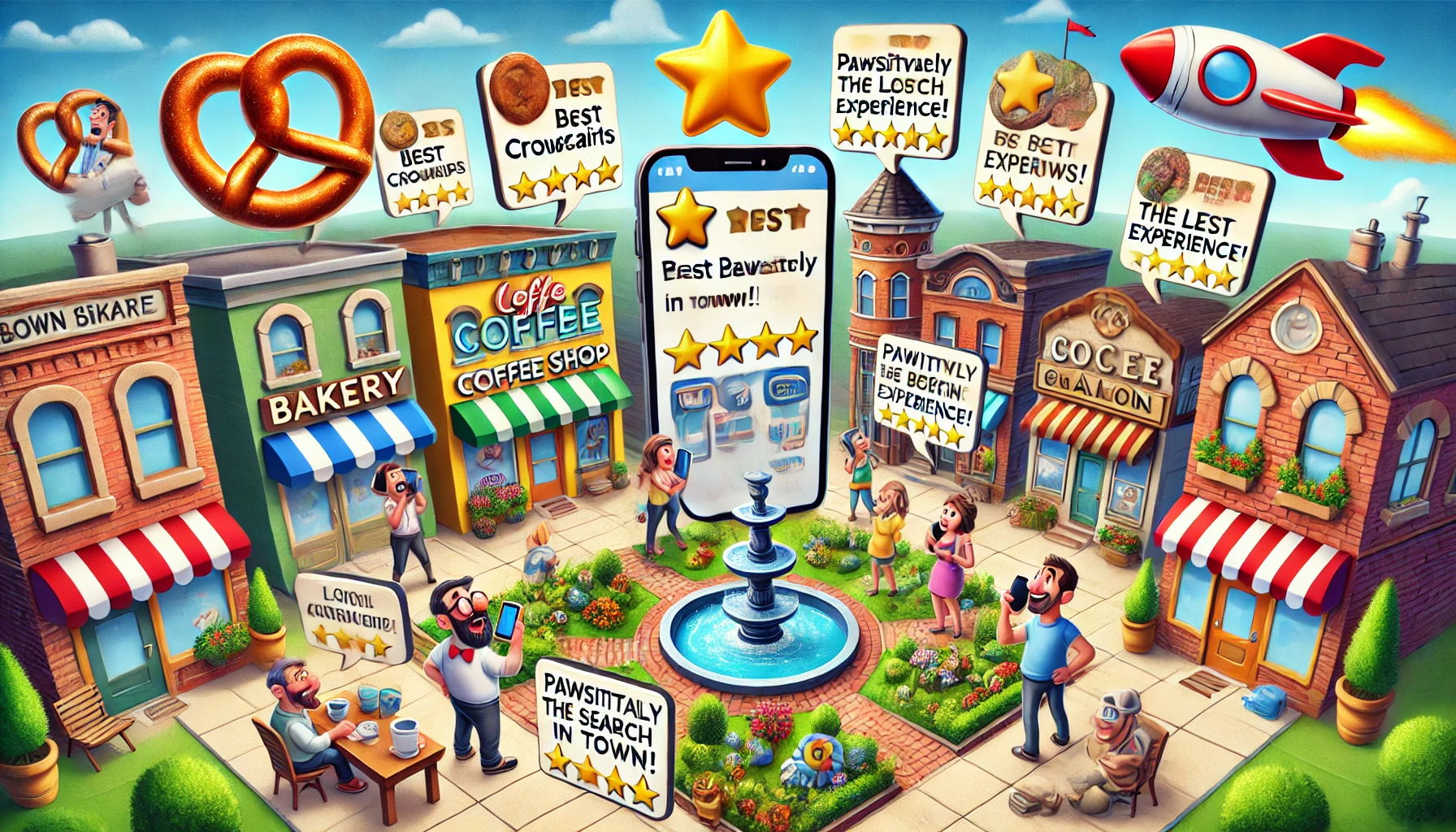Increasing online reviews for restaurants: Enhance your digital presence

The importance of online reviews
In today’s digital age, everyone is a critic. Online review platforms play a crucial role for restaurants, significantly influencing their success. People are more inclined to try a new restaurant if someone they know and trust recommends it.
Word of mouth is incredibly powerful, and online reviews serve as an extension of this.
A Harvard Business School study found that a one-star increase on Yelp can boost a restaurant’s revenue by 9 percent. Additionally, a study from Berkeley University suggests that a half-star improvement in a Yelp rating makes it 30-49 percent more likely for a restaurant to fill all its seats during peak evening hours.
Managing restaurant reputation
Review sites offer substantial benefits for both independent restaurants and chains. They provide essential details like name, address, hours, reviews, and sometimes a menu.
They appear more frequently in organic search results than most restaurant owners’ websites, resulting in a significant number of referrals, but only if you manage your online reputation carefully.
Obtaining reviews, even deserved ones, isn’t always straightforward. Establishing a process or using a review management tool can significantly increase the number of reviews compared to simply hoping customers remember to leave feedback.

Tips for restaurants to get more reviews
Requesting reviews
While most satisfied customers are happy to leave a tip, few think to leave a review. However, many will comply if asked. Often, just asking is enough.
But people get busy and forget. You can leave reminders in your store, near the register, or on the door as they leave, but there are more effective methods to ensure you capture feedback from happy customers.
Print a request on their bill or include a small card as a reminder. The best approach is to encourage them to share their email, perhaps by mentioning a loyalty program.
Then use reputation management software to request that review.
Customer service
Poor customer service is a primary reason people don’t return to a business, especially restaurants. The way customers are treated is paramount, but other issues like prompt seating and service also matter.
According to Lee Resources, around 80 percent of companies believe they provide “superior” customer service. However, only about 8 percent of their customers agree.
This significant discrepancy is something all businesses should address.
Bottom line: Exceed expectations wherever possible.
Food quality
A close second in importance is the overall experience of the food. If you want positive online reviews, the food needs
often eager to share their positive experiences and spread good word-of-mouth.
Building relationships with new guests
When your restaurant is new, building relationships and a list of regular guests takes time. Start from day one to build a regular guest list and continually foster positive relationships.
Software can assist by capturing guests’ data, including special occasions like birthdays and anniversaries, helping you to build a positive rapport over time.
Engaging with existing reviewers
Engaging regularly with both positive and negative reviewers can significantly help grow your business. Responding to positive reviews shows appreciation and encourages repeat visits.
Addressing negative reviews with a promise to improve can spread positive sentiments. Personal engagement is a key strategy for increasing positive reviews.
Utilizing review management software
If you use software for table bookings, ensure it includes review management functionality. This allows you to differentiate between reviews and feedback and encourages guests to leave reviews. Such software helps increase positive reviews and boosts customer engagement.
Keeping your business profile updated
Many restaurants maintain business profiles on platforms like TripAdvisor and social media. Regular updates are crucial to attracting more visitors.
Restaurateurs should update pictures and content regularly to encourage guests to leave reviews. An active social media presence and engagement with guests also encourage reviews, as guests feel more connected to an up-to-date and relevant profile.

Creating a review landing page
Creating a dedicated review landing page on your restaurant’s website is an effective way to collect customer feedback and showcase your online reputation. This page serves as a centralized platform for directing customers to leave reviews, making it easy for them to share their experiences with your restaurant.
Designing the landing page
When designing your review landing page, keep the following best practices in mind:
Keep it simple and intuitive: Ensure that your page is easy to navigate, with a clear call-to-action (CTA) that encourages customers to leave a review.
Use a concise headline: Clearly state the purpose of the page, such as “Share Your Dining Experience” or “Leave a Review.”
Add a brief introduction: Provide a short paragraph explaining why customer feedback is important to your restaurant and how it helps improve their dining experience.
Include review platform links: Add links to your review profiles on platforms like Yelp, Google, and TripAdvisor, making it easy for customers to leave a review.
Make it mobile-friendly: Ensure that your page is optimized for mobile devices, as most customers will access it on their smartphones.
By following these design principles, you can create a review landing page that effectively funnels customer feedback and helps build a strong online reputation for your restaurant.
Responding to comments—good and bad
It’s well established that 96% of customers read not just reviews but also the business’s responses to them. This underscores the importance of being engaged and interactive.
Whether the feedback is positive or negative, every comment offers an opportunity to demonstrate your restaurant’s commitment to excellence.
Strategies for effective review management
Acknowledge all feedback: Respond to every review, even if it’s just a star rating. A simple “thank you” can go a long way. Avoid generic responses and personalize your reply by addressing the reviewer by name.
Show genuine care: Highlight specifics from detailed reviews in your responses. This shows that you’ve taken the time to read and appreciate their feedback. Always express gratitude and emphasize your dedication to enhancing the dining experience.
Handle criticism gracefully: When facing negative feedback, avoid being defensive. Instead, apologize sincerely and ask how you can make things right. A friendly and understanding public response not only mends individual relationships but also positively influences the perceptions of potential customers.
Go the extra mile: In cases of dissatisfaction, consider reaching out privately to discuss further resolutions. Seeing a restaurant’s eagerness to make amends can often lead customers to revise their reviews, reflecting the positive turnaround.
By actively and politely engaging with your online feedback, you foster trust and positively influence consumer behavior.
Most important review sites for restaurants
If you’re wondering which online review sites are most important for managing your restaurant’s reputation, consider the following list. The order represents the sites with the most influence:
Yelp
Facebook Google
TripAdvisor
Foursquare
Zomato
OpenTable
Zagat
Gayot
Dine
This list is not exhaustive. There are many other review sites like Citysearch, Savored, and Foodspotting, among hundreds more, but we’ve narrowed it down for you.
While few restaurants will make it into the Michelin Guide, the review sites listed above are the ones most restaurant owners should be concerned with.
By following these strategies and maintaining a strong presence on key review platforms, restaurants can significantly enhance their online reputation, attract more customers, and ultimately increase their revenue.

Expert opinions on how to get more reviews about restaurants
Megan Walters, Digital marketing specialist “Restaurants should focus on making the review process as seamless as possible. QR codes placed on receipts or table tents that link directly to review sites can streamline the process. Ensuring that these codes are prominently displayed and easy to use will increase the likelihood of customers leaving reviews.”
Dr. Oliver Grant, Customer experience analyst “Implementing a loyalty program that rewards customers for leaving reviews can be very effective. Points can be given not just for frequent visits but also for detailed, constructive reviews. These points can then be redeemed for discounts or exclusive offers, encouraging repeat business and more reviews.”
James Porter, Restaurant consultant “Creating an unforgettable dining experience is crucial. From exceptional customer service to a unique menu, everything counts. Once patrons have a memorable visit, gently remind them to share their experiences online. Personalized follow-up emails thanking them for their visit and including links to review sites can significantly boost review numbers.”

 7 min
7 min 







